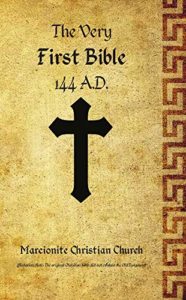I recently came across something claiming to be “The Very First Bible.” It claims to be an authentic translation. I'd love to hear your thoughts on this—whether we need to know this information, or if it's just a scam. — M.C.
I’m not sure I’d call it a scam—especially since they’re giving away the e-version for free—though it certainly is deceptive. Yes, there are numerous far-out claims (like this one), and most scholars don’t consider it worth their effort to refute them. After all, there’s already abundant material available on the biblical text and translation.
The Very First Bible (ed. A. W. Mitchell, 2020) is a rehash of the teaching of Marcion of Sinope (a town in Asia Minor on the Black Sea), which was rejected by the 2nd-century church. Marcion arrived in Rome by 140 AD, promulgated his heterodox doctrines, and set up his own churches. Here’s what he taught:
- The creator God of the Old Testament is not the true God. He is vengeful, unknowable and unloving, in contrast to the loving and gracious god of the NT. In fact, Yahweh is an inferior tribal deity of the Jews.
- A literal reading of the OT makes it clear that this this god is finite, weak, and error-prone—unworthy of worship.
- The Law of Moses is evil; Judaism is evil. Works like Matthew, Mark, Acts, and Hebrews are too “Jewish.” There is no need to study the Old Testament.

- Luke [mutilated] is the only gospel we can trust—once the parts friendly with the OT have been removed. Recall that Luke was Paul’s traveling companion, and a Gentile.
- Of the apostles, Paul alone correctly understands salvation. All other apostolic writings are false.
- Ten of Paul’s letters [heavily edited] are scripture. They are Galatians, 1-2 Corinthians, Romans, 1-2 Thessalonians, Colossians, Philemon, and Philippians—and “Laodiceans” (a letter mentioned in Col 4:16, which, like many of Paul’s noncanonical letters, did not survive).
- Thus the true New Testament has only 11 books. As the entire Old Testament is ignored, these 11 constitute the entire Bible!
Marcion was rightly excommunicated by elders of the church of Rome in 144 AD. (His movement continued to endure, however, for another three centuries.) Was the excommunication unfair? Does The Very First Bible, 144 AD rest on sound reasoning? Where does the evidence lead?
Unlike the apostles, Marcion did not know the Lord in the flesh. Further, there is evidence this was an immoral and contentious person. Nevertheless, he was highly influential, and the movement he started outlived him by a few centuries. Tertullian (c.200 AD) famously wrote, "Let Marcion's eraser be ashamed of itself" (Adv. Marc. 5.42). Here’s why:
- There is no reason to be ashamed of the Jewish “God of the Old Testament,” for he is the same Deity worshipped by the Jews and Christians of the New Testament. He has not changed (Mal 3:6; Jas 1:17).
- Moreover, he is the God and Father of Jesus, the same God that is revealed more fully in Christ (John 1:1, 14-18; Col 2:9).
- The Old Testament was, in fact, the “first Bible”—and Scripture for Jesus and the apostles. And it's an essential part of God’s Word to us (Rom 15:4; 1 Cor 10:11; 2 Tim 3:17).
- The OT speaks of Christ prophetically (Luke 24:27, 32, 44; 47-48; 1 Pet 1:10-11).
- Jesus clearly validates the OT (Luke 4:17-21; John 5:39), as does Paul (2 Tim 3:14-17).
- Whereas Marcion derided Abraham, Jesus and Paul clearly held him in high regard (Matt 8:11; Gal 3:7).
- If Paul is the only trustworthy apostle, then were Jesus’ years training the Twelve entirely wasted? He had guaranteed them the Spirit would work through them to reveal the truth (John 14:25; 16:12-13).
- Paul validated the other apostles, just as they validated him (Acts 9:27-28; Eph 4:11; 2 Pet 3:15-16).
- Luke wrote not only the gospel that bears his name, but also the book of Acts—which Marcion excluded (see Luke 1:3; Acts 1:1).
- Despite Marcion's attempt to promote salvation by faith alone by invalidating the Law—which he rejected for making obedience essential to salvation—both testaments require an obedient faith (Deut 11:11, 13; John 14:23; Acts 5:32; Rom 1:5; 1 John 2:5).
- We have no right to “pick and choose” which scriptures to follow (Jer 36:23; 2 Tim 4:2-4).
Interestingly, while Marcion attempted to shrink the biblical canon, removing the books he disagreed with and rewriting others to bring them in line with his views, the Gnostics (also active in the second century) penned new books, in effect attempting to expand the canon. The impact of both movements motivated the early church to clarify its views both on the OT and on which NT books were genuine. So, in a way, the heretics may have provided a valuable service.
Knowing a handful of basic facts about the Bible, the interconnectedness of Scripture, and the power of the Word will help us not only to be stronger spiritually, but also to be able to refute error. This is important in a day of fake news, slippery philosophy, and widespread biblical illiteracy.
I mentioned earlier that I didn’t think “scam” was the right word for the highly improbable notion being advanced in The Very First Bible. But the phrase “conspiracy theory” comes to mind, and I think it’s a pretty good description. Don’t get sucked in. This is nothing more than a warmed over 2nd-century attempt to neutralise the OT, make the NT more palatable, and promote salvation by faith alone.
To learn more about how the Bible came together—two testaments and scores of books (but not the phony works that “didn’t make the cut”— you might enjoy the 5-part series "How the Bible Came to Be.” Start here.








